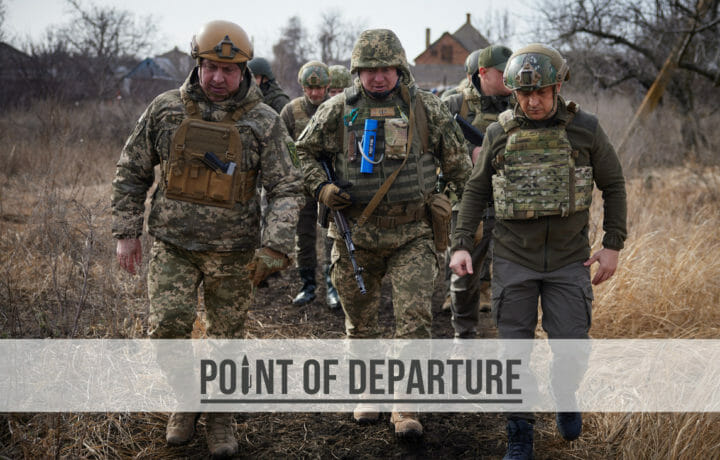“We Ukrainians are a peaceful nation. But if we remain silent today, we will be gone tomorrow!” – Volodymyr Zelensky
“I need ammunition, not a ride.” The quote itself was a prime example of what has set Ukrainian President Volodymyr Zelensky apart in a crisis unlike any other we’ve seen in our lifetimes. Facing a Russian invasion of his country – a generational crisis of existential proportions – he stood his ground, choosing to fight rather than evacuate. Defiant, determined, and far from defeated, Zelensky donned a field jacket, helmet, and flak vest and personally walked the lines of the battleground. He did something rare among elected leaders today: he led from the front.
In a moment, he was Lincoln walking the streets of Richmond, Roosevelt at the lectern with a bullet in his chest, and Reagan exhorting Gorbachev to “tear down this wall.” He was Washington crossing the Delaware, Chamberlain leading a bayonet charge at Little Round Top, and Patton spurring Third Army across the plains of Europe. Zelensky was leading by example, doing what his people chose him to do without ever knowing how important a choice that might one day be.
For those willing to assume the mantle of leadership, we often hear those three words: lead by example. They are, without a doubt, the three most important words in vast lexicon of leadership. In the military ranks, those three words represent and reflect our values, professional ethic, and warrior ethos. We tend to weave the idea behind them into trite slogans like “Do the right thing” and “Always choose the hard right over the easy wrong.” But if you truly lead by example, you don’t need any other words. Just those three simple words.
In his 2014 book, “Leaders Eat Last,” author and leadership expert Simon Sinek extolled the virtues – and necessity – of leading by example. On the surface, the main point seemed obvious, something we’ve all heard and most of us at least try to emulate. In reality, there is far more to leading by example than waiting for everyone else to eat before you stuff your yaw (and, in truth, there is a lot more to the book than the title suggests). Leading by example requires a rare combination of courage, character, and candor, all of which Zelensky has exhibited without fail.
How Zelensky Leads By Example
For me, leading by example conveys some very basic concepts that frame my philosophy as a leader. They reflect years of mentoring and development, from my time as a junior leader to years serving alongside some of our military’s most senior leaders. They capture the essence of what it means to lead: who we are and who we endeavor to become.
1. Words and deeds.
Zelensky doesn’t mince words, and neither should you. He says what he means and means what he says. He didn’t just ask the people of Ukraine to take up arms in opposition to a Russian invasion, he led the charge himself, all the while knowing that he was as high value a target as it gets. Your words and actions must always be in concert — if you say it, do it.
2. Keep calm and lead on.
Maintaining your cool when the pressure’s on sets a lasting example. This has been Zelensky since this situation first began to unfold, even before the invasion: cool, calm, and committed. The old advertising slogan “Never let ‘em see you sweat” was simple, direct, and spot on. Keep your cool, stay focused on the task at hand, and steer the ship through the storm.
3. Lead from the front.
It would have been understandable for Zelensky to raise the white flag in the face of seemingly overwhelming force, or even to evacuate to a safe haven from where he could continue to lead the fight. But that’s not how a true leader sets the example. If you’re going to do something, give it your best effort and stay with it until the very end. You might not always come out ahead, but the effort and the attitude set a strong example for others.
4. Risk is part of the job.
There are few professions as dangerous as those where daily decisions carry the weight of life-and-death consequences. This is no place to be risk averse, the faint of heart. Outmanned and outgunned, Zelensky refused to be outmaneuvered. He embraced risk at every turn, finding opportunity where most leaders would fear to tread. Always remember, risk is a potent catalyst that fuels opportunity. Or, as Wayne Gretzky so eloquently stated, “You miss 100% of the shots you don’t take.”
5. When in charge, take charge.
You’re the leader. Lead. Throughout this crisis, there’s never been a question of who’s in charge in Ukraine. From the outset, Zelensky has been the face of his nation and the voice of a defiant people. I used to think that Patton said it best: “Lead me, follow me, or get the hell out of my way.” But as the Russian military prepared to invade his country, Zelensky set the tone early: “If we come under attack, if we face an attempt to take away our country, our freedom, our lives and the lives of our children, we will defend ourselves. When you attack us, you will see our faces. Not our backs, but our faces.” It doesn’t get any clearer than that.
Leaders Will Shine During a Crisis
A mentor of mine once counseled me to “remember that your troops are always watching.” They see everything you do, hear everything you say, and feel the impact of everything you decide. Regardless of how all of this ends, the people of Ukraine will always know that when it mattered most, they had a president who took charge and led by example. The Lion of Kyiv was the leader they needed when they needed him most.




